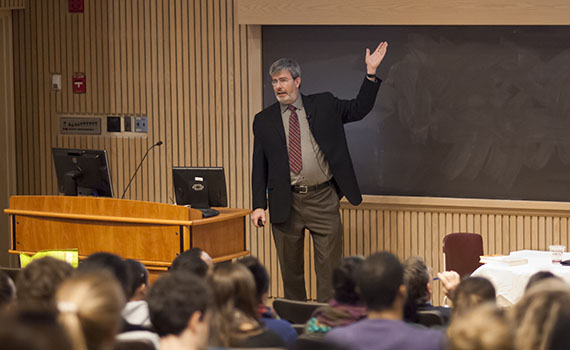
UCLA Law Professor Richard Sander discusses affirmative action in Love Auditorium. (Photo by Gabriela Bezerra ’13)
As the United States Supreme Court wrestles again with the issue of affirmative action in higher education, Colgate students and faculty discussed the sensitive subject openly with one of its most vocal critics.
Richard Sander, co-author of Mismatch: How Affirmative Action Hurts Students It’s Intended to Help, and Why Universities Won’t Admit it, gave a well-attended public lecture March 26, after which he had dinner in the ALANA Cultural Center with faculty and students.
The next day he joined Prof. Stanley Brubaker’s Civil Rights and Liberties class and held a more granular discussion of his data with social sciences faculty.
“It goes to show that at Colgate, diversity is something we’re not afraid to discuss,” Brubaker said.
“This is a tough topic,” Sander said to Brubaker’s 10 students gathered around a seminar table in Persson Hall. As he might with the students he teaches at UCLA School of Law, he walked through each major affirmative action case that has been heard by the U.S. Supreme Court, offering his analysis and taking occasional questions on key points.
Sander also addressed Fisher v. University of Texas, which was argued in October and may be ruled on at any time. “This is a case that’s very divisive…,” he said. “My sense is the Court is going to rule against the University of Texas.”
Two arguments against Texas in the the current case, Sander said, are the lack of a time frame for the policy to expire, and the unclear end goal of the institution’s policy.
Based on data he has collected, largely from law schools, Sander believes affirmative action often creates unintended negative consequences when elite schools accept students that may be less academically prepared in an effort to become more diverse.
Lauren Bender ’15, pointed out that each of the court’s rulings tend to leave loopholes that can be exploited, leading to additional court challenges. “It appears there’s always another case where it’s slipping through,” Bender said.
At Sander’s presentation in Love Auditorium Wednesday, Michelle Sagalchik ’15, an education and history double major, stood to ask rhetorically if such policies should be abandoned.
A self-described liberal, Sander does not think affirmative action should be eliminated, but he believes It should be applied more in a transparent manner, which he told the students Supreme Court rulings have failed to achieve.
Rhonda Levine, professor of sociology, countered Sander’s argument, at one point to the applause of many students in attendance. Levine said even though affirmative action policies may be imperfect, they help address what she sees as persistent national inequality.
“There has always been racial preference in the United States,” Levine said. “It’s just been white preference.”
Sander’s visit was co-sponsored by Colgate’s Arnold Sio Chair on Diversity and Community, the Center for Freedom and Western Civilization, and the Institute for Philosophy, Politics, and Economics (PPE).
Sander is one of several thought-provoking speakers visiting Colgate this semester. Sheryl Sandberg, Facebook chief operating officer and author of the New York Times bestselling book, Lean In, will speak as part of Entrepreneur Weekend April 5. Former Mexican President Felipe Calderón will be the Global Leaders speaker April 13, and former Congressman Ron Paul will be on campus April 24.